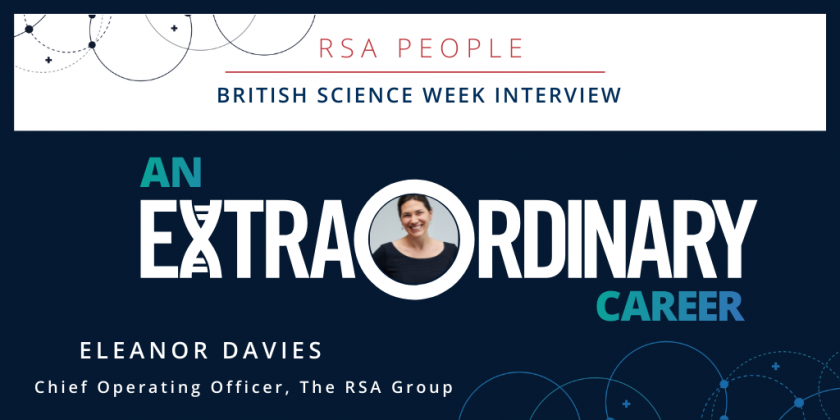RSA People | British Science Week interview with Eleanor Davies

Overcoming Barriers for Women in Science
From COVID-19 vaccines to space programmes to DNA, women are at the source of many of the scientific discoveries, inventions and innovations that shape our lives. But despite their remarkable contribution, women still represent just 33.3% of researchers globally, and their work rarely gains the recognition it deserves. Less than 4% of Nobel Prizes for science have ever been awarded to women, and only 11% of senior research roles in Europe are held by women1.
In recognition of International Women’s Day and British Science Week, Eleanor Davies, Chief Operating Officer at The RSA Group, shares her views on how we can overcome barriers for women in science and encourage more women to pursue leadership roles in the industry.
Are there any women in science that you find particularly inspiring?
I think of Marie Curie as the original godmother for women in science. She fought against the social norms of her time to succeed in a male-dominated world and was single-minded in her pursuit of scientific progress, but she was also a very effective collaborator who was able to leverage others’ talents and capabilities. As a headhunter, I am always most impressed by those outstanding and unselfish people who are brilliant not only in isolation, but who can work effectively with others and bring out the best in them.
What are the barriers for women in science and how can we overcome them?
I grew up absenting myself from a future in science and maths because of a nebulous (and as it turns out, utterly ill-conceived) notion that, as a girl, I wouldn’t be any good at those subjects. We need to find ways to remove the social constructs and myths that get into the heads of girls and women around what they can achieve in historically male-dominated disciplines. We also need to identify teaching modes and methods that work more effectively for girls – wherever you stand in the nature versus nurture debate, there’s compelling neuroscientific evidence to show that boys and girls learn differently2 – and to develop more STEM classes, activities and initiatives that are specifically geared towards girls and young women.
A pivotal moment for a woman’s career is the decision whether to have children. I had my first (and admittedly only!) baby at 36, and I know I benefited professionally from having a child at a time when my husband and I could afford childcare to allow us back to work full time. I believe passionately that women with children can move forward at the same pace as their male colleagues if they get the support they need. Women need a partner who will share the parenting burden equally (or if they do not have a partner, the salary to afford full time care); an employer who does everything in their power to encourage them back to the workplace; and crucially, a society that endorses the notion of equal parental care contribution, regardless of who has given birth to the baby. If we can achieve this, we will see an end to the depressing trend of women setting out on fabulous careers in STEM only to be forced into a choice between their child and their professional calling. Moreover, we will see a virtuous and widening circle of gender equality that gives future generations ever more opportunity for growth and success.
What advice would you give to young women thinking about starting a career in science?
As with any career, talk to as many people as you can and ask everyone you know who else they know. Think about where you want to end up and what matters to you. Try and find an inspirational role model whose career path you can use as a very high-level map, and then forge your own path as you go. Do not allow society’s preconceptions, workplace prejudices or your own unconscious assumptions to influence what you think you can or cannot achieve. You have so much to offer, and humankind needs you!
If you would like to talk more to Eleanor about these issues, or about opportunities to join our team at RSA, contact her at Eleanor.Davies@theRSAgroup.com.
1UNESCO Science Report: towards 2030 (2021)
2Kulturel-Konak, Sadan, Mary Lou D’Allegro, and Sarah Dickinson. “Review of gender differences in learning styles: Suggestions for STEM education.” Contemporary Issues in Education Research (CIER) 4.3 (2011): 9-18.